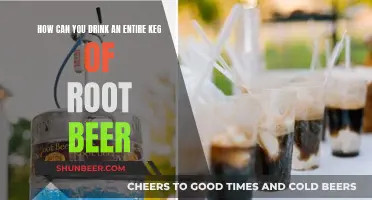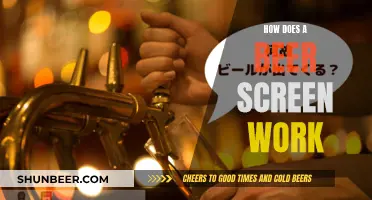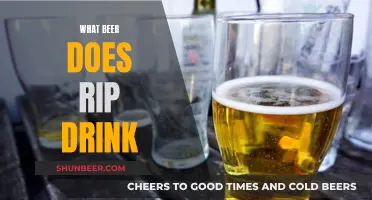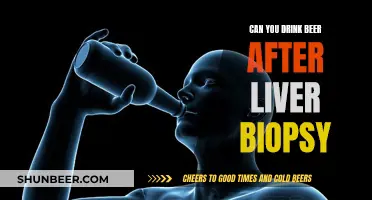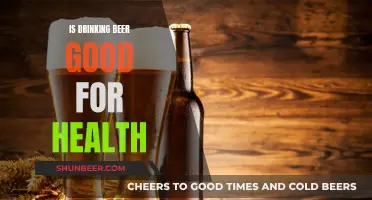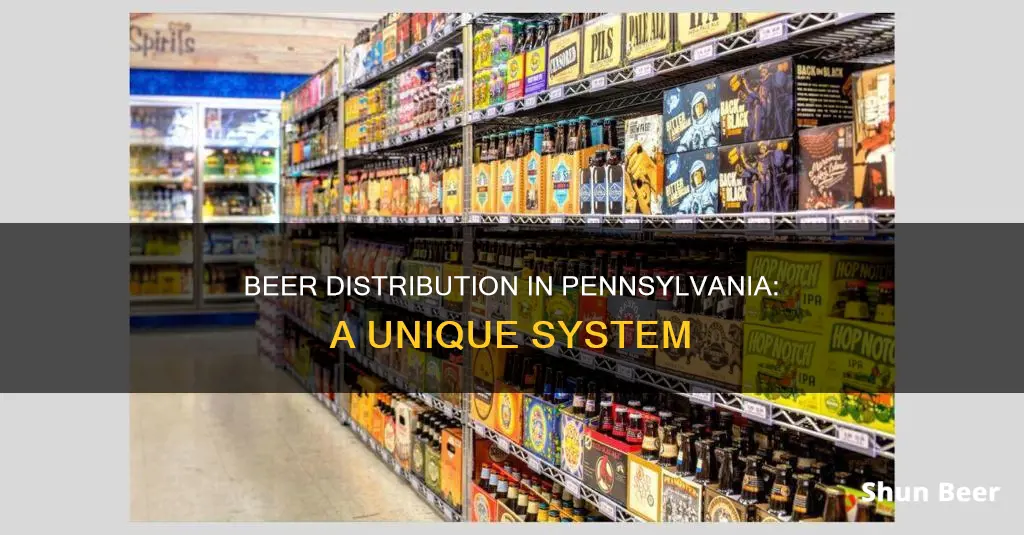
Pennsylvania has some of the strictest alcohol regulations in the United States, which can be traced back to the Prohibition era and the stance of Gifford Pinchot, who served as governor from 1923 to 1935. Beer distribution in the state is governed by a complex set of laws and licenses. Brewers holding a brewer's license are generally permitted to self-distribute, unless they also hold an add-on hotel, restaurant, or brewpub license. Distributors are authorized to sell beer to unlicensed customers in various package configurations, including cases, 12-packs, six-packs, and single bottles. These distributors typically have similar operating hours to Wine and Spirits stores and other retail establishments, with restricted sales before 9 am on Sundays.
What You'll Learn
- Self-distribution is allowed for brewers with a brewer's license, unless they also have a hotel, restaurant, or brewpub license
- Wholesalers must be provided with written distribution agreements by brewers, outlining exclusive territories for brand distribution
- Pennsylvania has some of the strictest alcohol regulations in the US, with a complex history of alcohol laws
- Retail liquor licenses allow for the sale of liquor, wine, malt, and brewed drinks for on-site consumption
- Beer can be purchased from a distributor or in limited quantities at supermarkets

Self-distribution is allowed for brewers with a brewer's license, unless they also have a hotel, restaurant, or brewpub license
Pennsylvania's alcohol laws are considered some of the strictest in the United States. The state's complex alcohol laws can be traced back to the Prohibition era and the tenure of Gifford Pinchot, who served as governor from 1923 to 1935. Pinchot maintained a tough stance on alcohol control even after Prohibition was repealed during his second term. He believed that the best way to prevent corruption in the alcohol industry was through state control. This led to the creation of the Pennsylvania Liquor Control Board, which licenses establishments, sets serving hours, and regulates prices.
One peculiarity of Pennsylvania's alcohol laws is that they allow for self-distribution by brewers holding a brewer's license. This means that these brewers can distribute their own beer without going through a middleman. However, this privilege is not extended to brewers who also hold an add-on hotel, restaurant, or brewpub license. In other words, if a brewer with a brewer's license expands their business to include a hotel, restaurant, or brewpub, they are no longer allowed to self-distribute. This restriction is also applicable to brewers with an alternating brewer's license.
It is important to note that brewers who self-distribute must comply with certain regulations. For example, they are prohibited from forcing wholesalers to accept beer they haven't ordered, preventing wholesalers from selling other brands or products, and setting the resale price for their products. Additionally, brewers cannot modify, terminate, or fail to renew their distribution agreements without good cause. Good cause is defined as the wholesaler's failure to substantially comply with the essential, reasonable, and commercially acceptable terms of the distribution agreement.
Brewers who wish to terminate their distribution agreements must provide at least 90 days' written notice to the wholesaler, stating the reasons for the termination. The wholesaler then has 90 days to address the claimed deficiency. However, brewers are allowed to immediately terminate their agreements if the wholesaler becomes insolvent or bankrupt, has their license suspended or revoked for an extended period, or engages in fraudulent conduct in their dealings with the brewer.
Beer Advocate: How Does It Work?
You may want to see also

Wholesalers must be provided with written distribution agreements by brewers, outlining exclusive territories for brand distribution
Pennsylvania's alcohol laws are considered some of the strictest in the United States, with peculiarities not found in other states. The state's complex alcohol laws can be traced back to the Prohibition era and the stance of Gifford Pinchot, who served as governor from 1923 to 1935. Pinchot maintained a tough stance on alcohol control, believing that state control was the best way to prevent corruption in the industry. As a result, Pennsylvania has a unique set of regulations governing the distribution and sale of alcoholic beverages, including beer.
In Pennsylvania, brewers holding a brewer's license are generally permitted to self-distribute. However, if those brewers also hold certain additional licenses, such as a hotel, restaurant, or brewpub license, they are not allowed to self-distribute. Brewers who choose to distribute their products through wholesalers must enter into written distribution agreements with those wholesalers. These agreements outline the exclusive territories in which the wholesalers are authorized to distribute the brewer's brands. The agreements must be kept at the brewer's premises, and a copy must be filed with the Board of Malt Beverage Compliance.
The written distribution agreements between brewers and wholesalers play a crucial role in the beer distribution system in Pennsylvania. These agreements provide wholesalers with exclusive territories for brand distribution, ensuring that they have the sole right to sell the brewer's products within a specific geographic area. This exclusivity helps to establish clear boundaries for wholesalers and prevents overlap or confusion in the market. It also allows wholesalers to focus their efforts and resources on promoting and selling the brewer's brands within their designated territory.
The distribution agreements not only outline the exclusive territories but also define the specific brands that the wholesaler is authorized to distribute. This brand designation ensures that wholesalers are clear on which products they can offer to vendors within their territory. It also allows brewers to maintain control over the distribution of their brands, ensuring that they are represented and sold in a way that aligns with their business strategies and goals. The agreements help to establish a structured and organized system for beer distribution in Pennsylvania, promoting fair competition and preventing territorial disputes.
In addition to the territorial and brand designations, the distribution agreements also include other important provisions. For example, brewers are prohibited from forcing wholesalers to accept beer they haven't ordered, interfering with the transfer of a wholesaler's business, or modifying or terminating the agreement without good cause. These provisions help to protect the rights and interests of both parties, fostering a stable and mutually beneficial relationship between brewers and wholesalers in the Pennsylvania beer distribution system.
A Beginner's Guide to Joining a Beer Crawl
You may want to see also

Pennsylvania has some of the strictest alcohol regulations in the US, with a complex history of alcohol laws
One peculiarity of Pennsylvania's alcohol laws is the quota system for liquor licenses. The current quota is one license per 3,000 county inhabitants, but existing licenses in areas that exceed the quota are grandfathered in. There are also various types and sub-categories of liquor licenses, including retail licenses, which allow for the on-premises sale and consumption of alcoholic beverages, and retail dispenser licenses, which are limited to the sale of brewed and malt beverages only.
Another unique aspect of Pennsylvania's alcohol laws is the restriction on where alcohol can be purchased. Spirits, for example, can only be purchased from state-owned Fine Wine & Good Spirits stores, which also sell wine but not beer. Beer, on the other hand, can be purchased from beverage distributors or in limited quantities at supermarkets. These distributors typically sell beer, soft drinks, and snack foods, and are allowed to operate within a similar timeframe as Wine and Spirits stores, with restrictions on Sunday sales.
Pennsylvania's complex alcohol laws also extend to minimum drinking age requirements, driving under the influence regulations, and attempts to privatize the sales of wine and spirits. The state has a zero-tolerance policy for underage drinking, with strict penalties for minors found in possession of or consuming alcohol. Driving under the influence is also heavily regulated, with maximum blood alcohol level limits for different types of vehicles and strict penalties for DUI convictions.
While there have been efforts to privatize the sales of wine and spirits in Pennsylvania, the state has maintained a monopoly over these sales since the repeal of Prohibition. Proponents of privatization argue that it could generate significant revenue for the state through sales taxes and license sales, while opponents raise concerns about the potential impact on small businesses. Overall, Pennsylvania's alcohol regulations remain strict and complex, with a unique history that continues to shape the industry within the state.
Crafting Beer Partnerships: Collaborating for the Perfect Brew
You may want to see also

Retail liquor licenses allow for the sale of liquor, wine, malt, and brewed drinks for on-site consumption
Pennsylvania's alcohol laws are considered some of the strictest in the United States, with a complex history that can be traced back to the Prohibition era. The state has a unique set of regulations surrounding the sale and consumption of alcoholic beverages, including liquor, wine, and beer.
One important aspect of Pennsylvania's alcohol laws is the licensing system. Retail liquor licenses are a specific type of license that permits the sale of liquor, wine, malt, and brewed drinks for on-site consumption. This license is intended for establishments such as restaurants and hotels, where alcohol is served alongside food. It's important to note that Pennsylvania had a "dry" stance on alcohol during the Prohibition era, and even after its repeal, the state maintained strict control over the alcohol industry.
Here's a detailed overview of how retail liquor licenses work in Pennsylvania:
On-Site Consumption
Retail liquor licenses allow for the sale and on-site consumption of liquor, wine, malt, and brewed beverages. This means that customers can purchase and consume these alcoholic drinks within the licensed premises, such as a restaurant or hotel dining area. The primary purpose of establishments holding this license is to provide food service, with alcohol sales being secondary. This distinction is important, as it sets the framework for the licensing requirements and regulations.
Serving Hours
The serving hours for establishments with retail liquor licenses are typically from 7:00 am to 2:00 am, Monday through Saturday. On Sundays, these establishments can serve alcohol from 11:00 am to 2:00 am with an additional Sunday Sales Permit. Entertainment, such as live bands, must also cease by 2:00 am. However, with an Extended Hours Food Permit, licensed establishments can remain open after 2:30 am for dining purposes, but alcoholic beverage sales must still stop by 2:00 am.
Seating and Space Requirements
To obtain a retail liquor license, establishments must meet specific seating and space requirements. The licensed area within the premises must be at least 400 square feet, equipped with tables and seating for at least 30 patrons. This ensures that there is sufficient space for customers to comfortably consume their meals and alcoholic beverages.
Off-Site Consumption
While the primary focus of the retail liquor license is on-site consumption, there are certain allowances for off-site consumption as well. For example, a restaurant or hotel that has sold a bottle of wine with a meal to a customer can allow them to take the resealed bottle off-site. Additionally, these establishments can sell limited quantities of beer (up to 192 fluid ounces) for off-site consumption, typically in the form of six-packs or twelve-packs.
County-Quota Law
Retail liquor licenses are subject to the County-Quota Law, which means that the number of licenses available is limited based on the population of the county. The current quota is one license per 3,000 county inhabitants, and existing licenses in areas that exceed this quota are grandfathered in. This quota system is managed by the Pennsylvania Liquor Control Board, which is responsible for licensing establishments, setting serving hours, and regulating prices.
In summary, retail liquor licenses in Pennsylvania allow for the sale and on-site consumption of liquor, wine, malt, and brewed drinks, primarily in restaurants and hotels. These licenses come with specific regulations regarding serving hours, seating requirements, and off-site consumption allowances. The unique history of Pennsylvania's alcohol laws has led to a complex and strictly controlled system, with a focus on preventing corruption and maintaining order in the state's alcohol industry.
Understanding Beer Shanks: How Do They Work?
You may want to see also

Beer can be purchased from a distributor or in limited quantities at supermarkets
Beer distribution and sales in Pennsylvania are subject to strict regulations, which can be traced back to the Prohibition era and Governor Gifford Pinchot's tough stance on alcohol control. The state's complex alcohol laws are considered some of the strictest in the United States.
When it comes to purchasing beer in Pennsylvania, there are two main options: distributors and supermarkets. Distributors hold a Distributor (D) license, which allows them to sell malt and brewed beverages, including beer, for off-premises consumption. They can sell beer in various package configurations, including cases, 12-packs, 6-packs, and single bottles. Distributors may also sell beer in original containers of 128 fluid ounces or more, such as kegs. These establishments are typically allowed to operate during the same hours as Wine and Spirits stores, with restrictions on Sundays, where a special license is required for beer sales before 9 am.
On the other hand, supermarkets have quantity restrictions when it comes to beer sales. They can sell limited quantities of beer, typically in the form of six-packs and twelve-packs, as well as individual bottles. Many supermarkets have started to operate restaurants attached to the main store, where they are permitted to sell small quantities of beer, provided they meet specific conditions. These conditions include having a defined separation from the rest of the supermarket, a separate cashier, and seating for at least 30 patrons.
It is worth noting that the hours of operation for beer distributors and supermarkets selling beer may vary, and local authorities can place additional restrictions. Additionally, Pennsylvania's alcohol laws have some peculiarities, such as allowing the sale of brewed or malt beverages for off-premises consumption in quantities less than or equal to 192 fluid ounces, which is why many bars and restaurants double as beer stores.
The state's complex alcohol regulations also extend to licensing requirements and serving hours for different types of establishments, including clubs, catering clubs, hotels, restaurants, and eating places. These establishments must adhere to specific guidelines regarding the sale and service of alcohol, and some licenses come with restrictions on the type of beverages that can be sold. For example, eating places with an (E) license can only sell malt and brewed beverages (beer) and are not permitted to sell liquor (wine or spirits).
Krusteaz Buttermilk: The Perfect Beer Batter Base?
You may want to see also
Frequently asked questions
There are several types of liquor licenses in Pennsylvania, including:
- Club (C) and Catering Club (CC) Liquor License
- Distributor (D) Liquor License
- Hotel (H) Liquor License
- Restaurant (R) Liquor License
- Eating Place (E) Liquor License
- Limited Winery (LK) License
- Limited Distillery (AL) License
- Licensed Brewery (G) License
The requirements for obtaining a liquor license in Pennsylvania vary depending on the type of license. For example, a restaurant (R) licensed establishment must have a minimum of 400 square feet of space, tables and seating for at least 30 patrons, and a current and valid health license.
In Pennsylvania, beer distribution is regulated by the state. Beer can only be purchased from a distributor or in limited quantities at supermarkets. Distributors are permitted to sell beer in any amount, while supermarkets have quantity restrictions. Distributors are allowed to sell beer, malt liquor, and soft drinks, but not wine or hard liquor.


